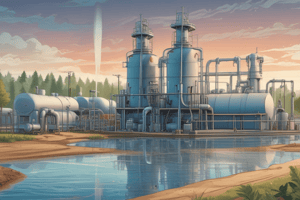Podcast
Questions and Answers
Where should water samples be examined?
Where should water samples be examined?
- Any laboratory
- A laboratory accredited by PNRI
- Food establishments
- Only a DOH accredited laboratory (correct)
Who is authorized to collect water samples for regulatory purposes?
Who is authorized to collect water samples for regulatory purposes?
- General public
- Water testing laboratory personnel
- DOH accredited laboratory personnel
- Only certified sampling personnel (correct)
What is the standard reference for water and waste water examination?
What is the standard reference for water and waste water examination?
- 22nd edition of Standard Methods (correct)
- PNRI standards for drinking water quality
- WHO guidelines for drinking water quality
- 21st edition of Standard Methods
Who is responsible for conducting sustainable development goals (SDG) water supply indicators?
Who is responsible for conducting sustainable development goals (SDG) water supply indicators?
What is the maximum TDS allowed in drinking water during emergency situations?
What is the maximum TDS allowed in drinking water during emergency situations?
What is the minimum chlorine residual required at the point of delivery for mobile tanks?
What is the minimum chlorine residual required at the point of delivery for mobile tanks?
Who is responsible for ensuring that water samples are collected and examined according to the standards?
Who is responsible for ensuring that water samples are collected and examined according to the standards?
What is the pH range allowed in drinking water during emergency situations?
What is the pH range allowed in drinking water during emergency situations?
What is the minimum acceptable level of chlorine dioxide residual in drinking water prior to distribution?
What is the minimum acceptable level of chlorine dioxide residual in drinking water prior to distribution?
What is the purpose of monitoring the level of thermotolerant coliform in drinking water?
What is the purpose of monitoring the level of thermotolerant coliform in drinking water?
What is the maximum allowable level of thermotolerant coliform in drinking water?
What is the maximum allowable level of thermotolerant coliform in drinking water?
What is the primary purpose of mandatory drinking-water quality parameters?
What is the primary purpose of mandatory drinking-water quality parameters?
What is the time frame for which the LGU shall provide temporary drinking water supply during an emergency?
What is the time frame for which the LGU shall provide temporary drinking water supply during an emergency?
What is the recommended method of disinfecting water during an emergency?
What is the recommended method of disinfecting water during an emergency?
What is the purpose of monitoring E. coli and thermotolerant coliform in drinking water?
What is the purpose of monitoring E. coli and thermotolerant coliform in drinking water?
What is the range of residual Cl2 that should be monitored during an emergency?
What is the range of residual Cl2 that should be monitored during an emergency?
What are the three key components of the improved framework for drinking-water quality?
What are the three key components of the improved framework for drinking-water quality?
What is the main objective of the Philippine National Standards for Drinking Water?
What is the main objective of the Philippine National Standards for Drinking Water?
What are the four parameters that drinking water quality shall be classified into?
What are the four parameters that drinking water quality shall be classified into?
What is the year of the official launching of the Philippine National Standards for Drinking Water?
What is the year of the official launching of the Philippine National Standards for Drinking Water?
What is the main reason for the revision of the 2007 Philippine National Standards for Drinking Water?
What is the main reason for the revision of the 2007 Philippine National Standards for Drinking Water?
What is the minimum requirement for water sampling and examination?
What is the minimum requirement for water sampling and examination?
What are the common water-borne diseases caused by parasites?
What are the common water-borne diseases caused by parasites?
What is the standard for drinking water quality in terms of taste, odor, and color?
What is the standard for drinking water quality in terms of taste, odor, and color?
What is the basis for the minimum number of samples required for water sampling and examination?
What is the basis for the minimum number of samples required for water sampling and examination?
What is the edition of the WHO Guidelines for Drinking-Water Quality that was released in 2011?
What is the edition of the WHO Guidelines for Drinking-Water Quality that was released in 2011?
Flashcards are hidden until you start studying
Study Notes
General Guidelines for Safe Drinking Water
- The Philippine National Standards for Drinking Water (PNSDW) conform to the Administrative Order (AO) and its Manual of Operation.
- The 2017 PNSDW has improved framework comprising 3 key components:
- Health-based targets
- A system of independent surveillance
- Specific guidelines
Revision of 2007 PNSDW
- Reasons for revision:
- Experiences of water service providers in complying with standards
- WHO Guidelines for Drinking-Water Quality 4th edition, 2011
- DOH AO 2014-0027, Water Safety Plan for all drinking-water service providers
- Sustainable Development Goals (SDG) water supply indicators
Scope and Coverage
- Drinking water service providers:
- Government and private developers and operators
- Bulk water, refilling station, vending machine operators
- Ice manufacturers
- Food establishments
- Residential, commercial, industrial, and institutional buildings
- Health and sanitation authorities
- Water testing laboratories
- General public
Classification of Drinking-Water Quality Parameters
- Mandatory parameters:
- Minimum parameters required for examination by all drinking water service providers
- Legally enforceable parameters
- Directly affect health through acute or chronic exposure
- Indicate the possible presence of other contaminants
- Exceed tolerable values on local monitoring data of the previous years
- Parameters classified into:
- Microbiological
- Physical
- Chemical
- Radiological
Water-Borne Diseases
- Common water-borne diseases:
- Parasites
- Bacteria
- Viruses
Standards for Drinking Water Quality
- Water should be:
- Clear
- Free from objectionable taste, odor, and color
- Comply with standard values for microbiological, physical, chemical, and radiological parameters
Standards for Water Sampling and Examination
- Initial and periodic examination:
- Microbiological
- Physical
- Chemical
- Radiological
- Minimum number of samples based on source and mode of distribution
- Collection of water samples:
- Comply with standard sampling requirements
- Only certified sampling personnel shall collect water samples for regulatory purposes
- Examination of water samples:
- Only in DOH-accredited laboratories
- Methods based on 22nd edition of Standard Methods for the examination of water and waste water (SMEWW)
Standards for Other Modes of Distribution
- Refilling stations:
- Initial and periodic examination
- Must meet sampling frequency
- Standard values for mandatory parameters shall be applied except for pH = 5-7 and TDS not exceeding 10 mg/L
- Mobile tanks:
- Cl2 residual: at least 0.5 mg/L but not exceeding 1.50 mg/L at the point of delivery
- Bulk water:
- Chlorine residual: at least 0.3 mg/L but not exceeding 1.50 mg/L
- Chlorine dioxide residual: 0.2 to 0.4 mg/L prior to distribution
Emergency Drinking-Water Parameters
- LGU shall provide temporary drinking water supply for 72 hours
- Water should be disinfected through boiling or chlorination
- Monitor Residual Cl2 (0.5-1.5) and E.coli/ThC
Studying That Suits You
Use AI to generate personalized quizzes and flashcards to suit your learning preferences.




